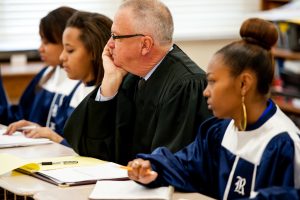Court of Appeals Judges Preside Over AP Government Lesson

Larry Eisenhauer, Chief Judge of the Iowa Court of Appeals, presides over a moot court lesson, part of an AP Government class at Roosevelt High School.
Students in AP Government classes at three DMPS high schools were assisted by judges from the Iowa Court of Appeals this week as they considered real cases pending before the US Supreme Court involving gay marriage and affirmative action.
At Roosevelt, Chief Judge Larry Eisenhauer oversaw the moot court proceedings. His colleagues, Judge Mary Tabor and Judge Anuradha Vaitheswaran, presided at Hoover and East, respectively.
At issue were Hollingsworth v Perry (a case where a lower court reversed a California ballot initiative that amended the state constitution to ban same-sex marriage as unconstitutional) and Fisher v University of Texas (where a lower court upheld an admissions policy that included race as a factor for admission).
“It was amazing to see the level of understanding the AP government students had when tackling the tough issues in current US Supreme Court cases,” said Judge Tabor, herself the parent of three DMPS alumni. “Their analytical work in this class will serve them well in their future education and job pursuits.”
In actual court proceedings the gears of justice can sometimes grind very methodically. But in AP Government you get the condensed version, where arguments are heard and rulings rendered (times two) in the space of one class period. And you get justices clad in choir robes, and intercom announcements about postponed soccer games and tennis matches, and a dropped penny rolling across the floor (in payment for counsel’s thoughts?) and gotcha grins between the bench and the barristers. But you also get real insight into how principles and concepts you’ve been studying in class play out in the proverbial real world.
Observers are even afforded behind-the-scenes access to judicial deliberations where the decisions are made. The student-justices are reminded to decide based on the merits of the arguments as opposed to who is the best arguer, or which student-lawyer[s] they’re friendlier with outside of the class/courtroom. They bandy back and forth about the 6th, 10th and 14th amendments and Prop 8 vs. Prop 22. They wonder why judges have to wear such cumbersome, not to mention hot, robes. And they debate the legal merits. In the case of Fisher v. U of Texas there are sidebars about directly relevant personal and ongoing experiences in the college admission labyrinth.
The jurists frequently interrupted arguments with questions, almost rudely it seemed. But afterwards they were complimented by the professionals for doing so because that’s the way it often goes in actual courts of law. Further authenticity was lent to the proceedings by a heightened sense of decorum. Besides the choir robes donned by the rulers, the petitioners and their counterparts also came appropriately dressed for the occasion, many of them wearing shoes as polished as their precedents.
“It was a distinct honor to have jurists from Iowa’s highest court in our classrooms to work with our students on such a critical lesson in American government,” said Amber Graeber, the district’s Humanities Coordinator.
Three (your) honors, to be exact.




